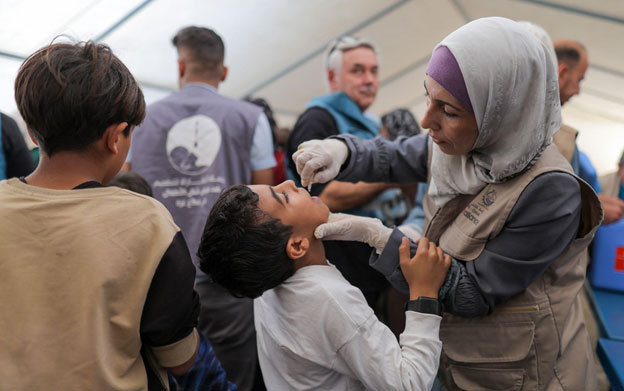UNITED NATIONS, Nov 08 (IPS) – On November 6, the World Health Organization (WHO) announced that the second round of polio vaccinations in the Gaza Strip has been completed. A total of 556,744 children under ten years of age received the mOPV2 vaccine along with a dose of vitamin A to ensure immunization. However, due to rampant hostilities from the Israeli Defense Forces (IDF), the campaign has not been entirely successful, leading to humanitarian organizations fearing that herd immunity has not been achieved.
During a United Nations (UN) press briefing, Spokesperson for the Secretary-General Stéphane Dujarric informed reporters that despite the numerous access challenges faced by aid personnel, the campaign has been relatively successful. Approximately 103 percent of children in central Gaza were immunized, meaning that more children in this region were reached than expected. 91 percent of the children in southern Gaza received the vaccines.
However, northern Gaza has been of great concern for humanitarian groups due to frequent access challenges and hostilities since September. Preliminary data from the UN suggests that only 88 percent of children in this region received the vaccine.
Figures from the United Nations Children’s Fund (UNICEF) show that there are an estimated 7,000-10,000 children that remain unvaccinated in the Jabalia, Beit Lahiya, and Beit Hanoun regions.
According to a press release from the Global Polio Eradication Initiative, at least 90 percent vaccination coverage during each round of the campaign is necessary in order to effectively stop the outbreak in Gaza and prevent the international re-emergence of polio. Due to Gaza’s compromised healthcare, water, and sanitation systems, civilians are particularly vulnerable to the spread of disease.
Escalated hostilities in the Gaza Strip in the days preceding the completion of the second round of vaccinations had significantly hampered immunization efforts. Despite the campaigns in central and southern Gaza having run relatively smoothly, hostilities in northern Gaza in the days preceding the completion of the second round of vaccinations had significantly hampered immunization efforts.




